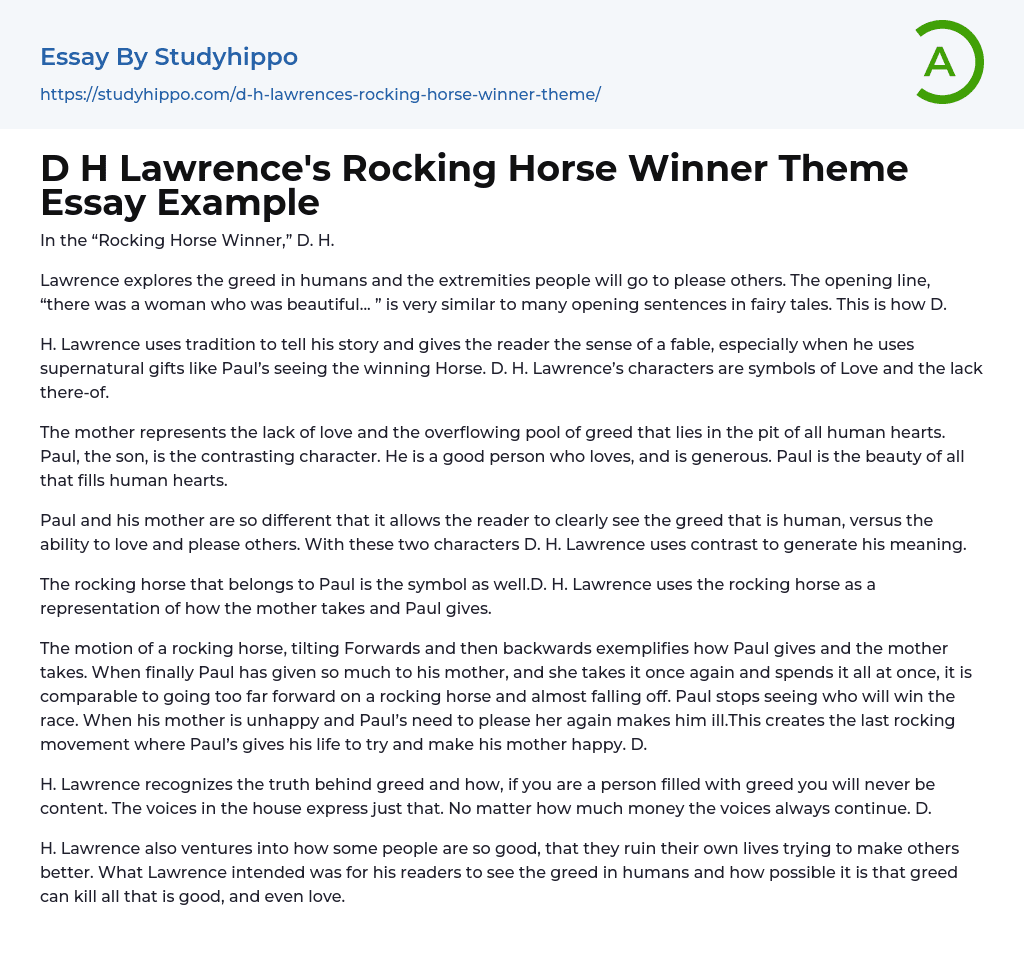In D. H.'s "Rocking Horse Winner,"
Lawrence delves into the greed inherent in humanity and the lengths individuals will go to appease others, drawing parallels between his work and the introductions of traditional fairy tales. In fact, the opening line reads, "there was a woman who was beautiful...".
H. Lawrence utilizes traditional storytelling techniques to create a fable-like atmosphere in his work, often making use of supernatural elements such as Paul's ability to perceive the winning horse. Within D. H. Lawrence's writing, the characters serve as symbols for both love and its absence.
The mother symbolizes the absence of love and the abundant desire for wealth that exists within every human being's core. Conversely, Paul, the son, is portrayed as a benevolent individual who expresses love and generosity. Paul embodies the positive emotio
...ns that reside within human hearts.
Through the use of contrast between Paul and his mother, D. H. Lawrence effectively portrays the human traits of greed and the ability to love and please others.
Paul's rocking horse serves as a symbol in D. H. Lawrence's story. It represents the mother taking from Paul, while he gives eagerly.
The act of a rocking horse, swaying in a forward and backward motion, illustrates Paul's giving nature and his mother's tendency to continuously take. As Paul exhausts himself by giving too much to his mother, and she quickly spends it all, it becomes akin to leaning too far forward on a rocking horse, nearly tipping over. This causes Paul to lose sight of the end goal. As his mother continues to be dissatisfied and Paul's desire to please her intensifies, he becomes physically ill. This results in a final push, a fina
rocking motion, in which Paul sacrifices his own life in an attempt to make his mother happy. D.
In acknowledging the veracity of greed, H. Lawrence asserts that those who are consumed by it will never find satisfaction. This truth is echoed by the never-ending voices inside the house, which persist even with increasing wealth. D.
In addition to exploring the idea that some individuals strive so hard to improve others that they ultimately sabotage their own lives, H. Lawrence intended to show readers the potential for human greed to destroy all goodness, including love.
- Book Summary essays
- Metaphor essays
- Reader essays
- Rhyme essays
- Literary devices essays
- Villain essays
- Books essays
- Genre essays
- Literary Criticism essays
- Writer essays
- Protagonist essays
- Simile essays
- Poem essays
- Book Report essays
- Book Review essays
- Greek Mythology essays
- Plot essays
- Tragic Hero essays
- Coming of Age essays
- Play essays
- Rhetoric essays
- Rhetorical Question essays
- Translation essays
- Understanding essays
- Reason essays
- Character essays
- Letter essays
- American Literature essays
- Literature Review essays
- Utopia essays
- Poetry Analysis essays
- Dante's Inferno essays
- Between The World and Me essays
- Incidents in The Life of a Slave Girl essays
- Flowers for Algernon essays
- Myth essays
- Everyday Use essays
- Boo Radley essays
- Genesis essays
- Richard iii essays
- Alice in Wonderland essays
- On the road essays
- Ozymandias essays
- The Nightingale essays
- Holden Caulfield essays
- Animal Farm essays
- 1984 essays
- A Hanging essays
- Shooting An Elephant essays
- A Tale Of Two Cities essays




